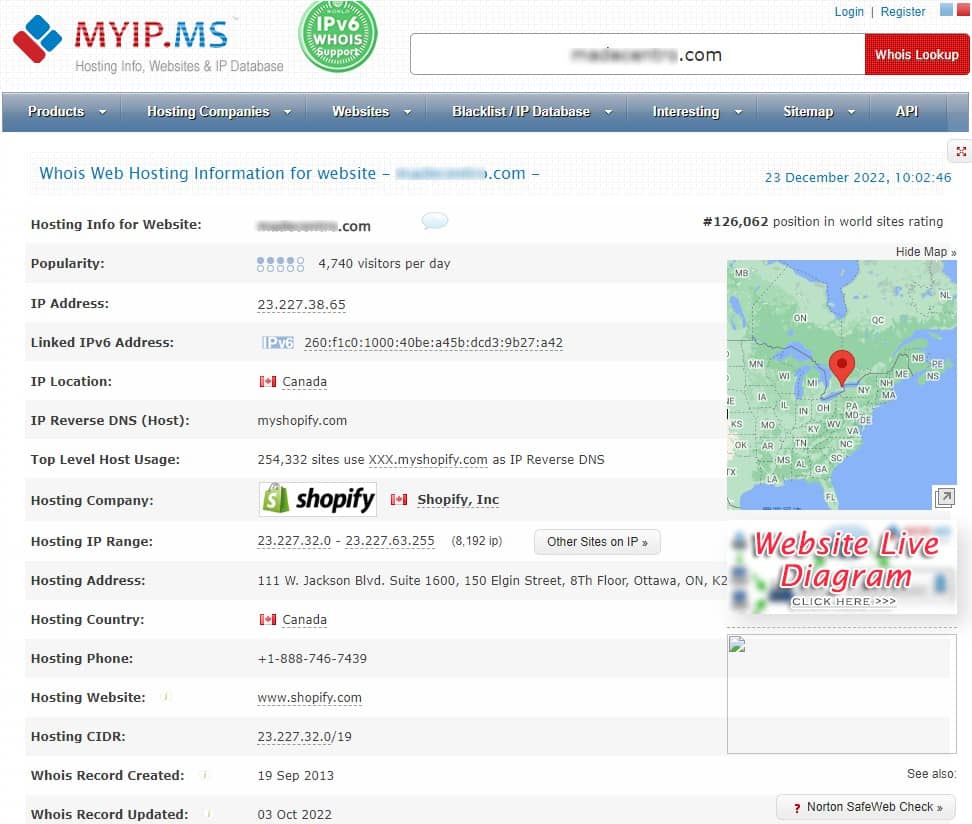Shopify is a popular eCommerce store builder that is perfect for medium-to-small businesses.
That’s why some of the largest online stores are built on Shopify.
If you know how to find Shopify stores in your niche, then there’s a lot you can learn from your competitors.
In this article, we’ll discuss how you can find and analyze other businesses in your niche and what you can do with that information.
So without further ado, let’s dive right into it!
Why Should You Find Other Shopify Stores in Your Niche?
Whether you already have a Shopify store or plan to create one, knowing about businesses in the same niche can be a great way to gain inspiration.
Before you store into the market, this research will give some insight into your niche’s local and global presence.
1. Setting Prices
Among other things, one of the most critical aspects of building a business is setting prices.
It’s a common misconception to price your products lower than your competitors, which often comes at a loss.
You wouldn’t be able to sustain your business if you had low profitability.
On the other hand, if you sell your products at extremely high prices, chances are your customers will turn to other businesses.
By looking at other Shopify Stores in your niche, you would also know how to sell your products.
For example, you could sell them in sets or design a different and attractive branding style, making your business more recognizable in the market.

2. Market Saturation
Market saturation is not something to be scared of, as it shows that a product is in high demand.
However, a highly saturated market can be a bit frustrating for small businesses when it comes to sales.
You may find other entrenched businesses in the same niche as yours that have won their customers over.
Even though you can overcome a saturated market with the right tactics, it’s better to find a different niche of stores with low market saturation on the platform.
3. Competition Research
Industry knowledge is ideal for an entrepreneur to understand the strengths and weaknesses of your niche.
This helps you understand what would help your business and what would harm it, leaving less room for mistakes.
Once you have expertise in your niche, it’s easier to build a more loyal customer base.
Moreover, it also gives you a chance to target your market gap and tweak your products to fit the right demographics.
4. Drawing Inspiration
While “finding inspiration” has always been debatable, we would like to mention that it is different from stealing ideas.
Working in the same niche as your competitors, as they do but from a different and unique angle, will help you move forward with your business.
Plus, it allows you to do something innovative and build a Unique Selling Point (USP).
5. Keyword Research
If you want your customers to find you, they should be able to search for you on search engines quickly.
Keyword research aids your Shopify store by being a part of your larger marketing strategy.
With the right keywords, potential customers can be targeted, find valuable insight, and make your business more searchable.

How Do You Find Shopify Stores in Your Niche?
There are multiple methods of finding Shopify Stores in your relevant niche. We’ve listed them down below.
Method 1: Using Shopify Store Spy Tools
Spy tools will be your best friend throughout your journey as an online entrepreneur in the eCommerce scene.
Spy tools such as Sopistores, Looooi, and Shopgram can offer valuable understanding more about the business strategies of your competitors.
They provide information on top-selling products, customer insight, and more. Some spy tools charge a fee, while others are free.
Purchasable Spy tools are primarily high quality and accurate, with statistical data and trend analytics to assist you in making a beneficial choice. While some high-quality free spy tools exist, most aren’t up to standard.
While there are many independent spy tools, fortunately for you, Shopify offers its spy tool as one of the site’s main attractions.
The Shopify Spy Tool is 100% free of cost despite being very accurate and actively updated.
Method 2: Start Using Ad Spy Tools
The difference between Ad spy tools and Store spy tools is noticeable. Ad spy tools use the methods of finding the most famous and relevant product ads which highlight a product’s social presence and online standing.
By carefully considering a product ad’s views, likes, and dislikes, you can easily decide whether or not to experiment with the product.
BigSpy and SpyFu are famous Ad spy tools with complex features allowing for efficient and thorough research.
Searching up your niche and going through a vast catalog of results from TikTok, Instagram, Facebook, etc., is less time-consuming than it would be with conventional searching on social media.
You can set the criteria for your results with trend longevity, timeline, and seasonal activity.
Method 3: Look for Shopify’s Success Stories.
Shopify is a platform that provides you with a lot of growth potential.
The platform also proudly promotes its successful entrepreneurs by sharing their stories.
Those stories are not only motivational, but also pinpoint ways others have found success in Shopify, and you can too.
These success stories are amazing to learn from, and this is precisely why Shopify shares them on its official site.

Method 4: Searching Through the Source code
An easy way to find other Shopify stores in your niche is by looking at the source code.
Simply search your product of choice on the Google search engine. The result will only be some of your competition. Still, you will find your biggest competitors here.
After you have found your competitors with the same niche, you will have to filter them to those that use Shopify.
The simplest way to do this is to right-click anywhere on your screen and select ‘view page source‘. Then simply press CTRL + F to open the search bar.
On the search bar, write Shopify and press enter, and you will get links to all the Shopify references in the results. This leads you to competing Shopify stores 80% of the time.
Method 5: Take a Look at Profiling Sites
BuiltWith is a profiling tool that is extremely easy to use. You can either download its Chrome extension or directly use BuiltWith site.
Open the URL of the website you want to analyze and click on the BuiltWith extension.
After that click on “Redirect” and you’ll see that the sites that are built using Shopify have “shopifyon.com” next to their name.

Note that, you might have to sign-up in order to use the Chrome extension.
If you want to avoid that then just look up the URL on BuiltWith’s search bar by opening the tools site – but of course, that isn’t as convenient.
You can also browse around the tool to also find other information about your competitors such as their location, technology spend, and more.
Method 6: Use the MyIP.ms Tool
This analyzing technique requires tools like MyIP.ms to find Shopify stores. They are like profiling tools but don’t run through keywords, links, etc.
Tools like MyIP.ms scan the IP address of a store and gather information for you.
You can use these to find the IP location, date of URL registration, average visits per day, and also the hosting company, which in your case would be Shopify.
All of this can be done with a simple URL that you enter into the tools search bar.

Method 7: Google Search Operators
While this may seem like a simple search, it is not. Google has a great way of finding Shopify sites exclusively by targeting and specifying their search terms ending with myshopifying.com.
However, you must type the relevant keywords followed by “site:myshopify.com” in your search bar for Google to run it through.

You will get a comprehensive list of competition touching your particular keywords. It is the easiest way to find stores associated with Shopify and work in your relevant niche.
Method 8: Search with inUrl
You can use the advanced search term “inurl:” in Google along with your desired keyword to find a list of online stores.
For example, if you’re looking for Shopify stores selling beauty products then your search would look something like “inurl: beauty myshopify”. It will return documents that mention the word “beauty” in their URL, and mention the word “myshopify” anywhere in the document.

While all results displayed would not be Shopify stores, using some of the methods above, you can filter them out.
Keep in mind that this technique isn’t as reliable, and you might have to enter different keyword variations to find what you’re looking for.
But you can use this method to find new leads, especially if you’re just starting and don’t have much info about your competitors.
As social media continues to unite the globe, social media marketing is the perfect outlet for eCommerce entrepreneurs to benefit from. We have proof of multiple brands that succeeded through the careful usage of social media.
When you’re marketing a product or niche, others will likely be doing the same thing, and learning from your competition is the easiest way to succeed.
Searching with relevant hashtags on popular platforms like Twitter and Facebook should get you plenty of results.
If you need more than that, you could also look up top influencers and celebrities who promote services or products touching your niche.

Method 10: Ask Around Online/Offline
Many may think of it as a plebeian approach, but if you’re not having luck with the other techniques and find them too complicated, you could always just ‘Ask Around.’
Yes, you heard it right; asking around never fails for any entrepreneur, whether online or offline. Asking for the best Shopify stores and information from industry insiders, experts, and cross-platform, same-niche friends can be of immense help.
You can join a training program or any online community for a steady stream of information.
How to Analyze Competitors in Your Niche?
Analyzing competitors in your niche is an important aspect of maintaining a successful business. Researching competitor prices, market strategy, digital presence, and target market and understanding their challenges and benefits can help you better your firm.
Analyzing competitors shouldn’t be about copying exact strategies or stealing customers; you may benefit more from complementation and collaboration.
Following are the steps for doing a competitor analysis in your niche and gaining insightful knowledge about the market landscape.
1. Examine Competitors’ Website
The first step is to examine competitor websites and look for patterns thoroughly. It can help to identify content and features that customers are drawn to, as well as understand what differentiates you from the competition.
Knowing what your competitors offer allows you to assess your competitive advantage and stand out. Tracking how your competitors use the web can help you optimize your own site.
Reviewing competitor websites can improve your online presence and give you a competitive edge.
2. Evaluate Their Pricing Model
Evaluating a competitor’s pricing model is an important next step after gathering information about the competition. This analysis will identify pricing strategy improvements.
Examining what competitors offer and how much they charge might help determine whether to set higher or lower prices.
Discounts, coupons, and loyalty programs can influence customers’ buying decisions and the cost of your business. Analyzing competitors’ pricing models ensures competitive prices and maximizes profits.
3. Study Their Marketing Strategy
Gaining an understanding of where your competitors are finding success in their marketing strategies is a valuable asset to any business.
Competitor analysis involves tracking how niche competitors engage customers and what campaigns they run.
You’ll learn what type of marketing resonates with potential customers, the competitor’s target audience, and which platforms they’re using. This might help you form your own campaign and reach the correct folks.

4. Learn about Their Shortcomings
To study competitors in your niche and design more effective business strategies, you must know their weaknesses.
Researching your competitors’ services, products, or delivery methods might help you fill those voids and expand the playing field in your favor.
Being aware of where your competitors fall short can let you capitalize and drive potential customers away from them directly into the arms of your business.
5. Facebook Audience Insights
Facebook Audience Insights is a tremendous research tool. You can find infinite ideas and information from millions of minds regarding your relevant niche.
You can see the results of public polls and surveys conducted by your competitors for themselves, getting to know the general public opinion on the most prominent social media app.
These Facebook users will help you determine the potential and profit of your dropshipping niche.
You’re also privy to more statistical data:
- Demographic information about age, gender, and lifestyle.
- Post or page likes.
- The location-based interest of local or international audience
- You learn the number of ads that are clicked, the comments made or promotion codes redeemed, as well as the type of devices used.
6. Directly Test Their Service
Testing competitors’ services might help you learn what the customers of your niche value and how to differentiate yourself.
Sign up for newsletters, check online ratings, or try out their service. By doing so, you can evaluate their customer service experience and see exactly how your own business measures up.
Knowing what works and doesn’t enables you to optimize your product or service for maximum success.
FAQs
Is Selling on Shopify Profitable?
Ultimately, yes. When you start an online business, setting up an online store is important. Launching a store on Shopify provides you with the required visibility online, giving you a chance to make a profit.

What Is the Best Niche for a Shopify Store?
You will find the best niche for a Shopify Store based on your requirements and research. Gardening tools, pet accessories, fashion and beauty products, and automotive accessories are some of the well-off niches.
How to Market a Shopify Store?
A myriad of marketing methods is available for Shopify Stores. Running paid ad campaigns is among the most popular and effective ones.
However, to reach potential customers organically, meaningful and high-quality content for your business is significant.
Final Thoughts
Finding the right niche for your online store and working on stabilizing and growing your venture can be a daunting task.
However, incorporating proper research tools can aid you in running a successful business.
It is as essential to study your competitors as it is to know your customers.
You learn and get inspired from them and aim to do better. With the proper research and implementation of your analysis, you can strengthen your business and customer base.
If you’ve wrapped up the research phase and are ready to move to the next step, then NicheDropshipping can help you.
Whether it’s product sourcing, warehousing, or private labelling, we can help you through each step of your entrepreneurial journey.
All you have to do is give us a call and let our agents know your requirements.

